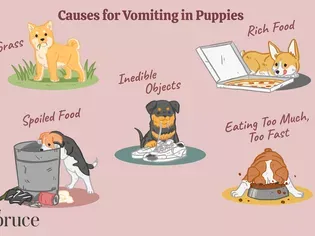Vomiting in Puppies
Updated on 04/26/24

Vomiting in Puppies: A Comprehensive Guide for Concerned Pet Parents
Vomiting is a common occurrence in puppies, causing concern and distress for their owners. Understanding the potential causes, symptoms, and appropriate treatment options is crucial for ensuring your puppy's well-being. This comprehensive guide delves into the intricacies of vomiting in puppies, empowering you with the knowledge to navigate these situations effectively.
Causes of Vomiting in Puppies
Puppies experience vomiting for various reasons, including:
- Dietary Indiscretion: Ingesting non-food items, such as toys, grass, or garbage, can irritate the stomach and cause vomiting.
- Infections: Viral and bacterial infections, including parvovirus, distemper, and coccidiosis, can result in vomiting as a symptom.
- Parasites: Intestinal parasites, such as roundworms and hookworms, can cause gastrointestinal upset and vomiting.
- Motion Sickness: Some puppies experience vomiting when traveling due to motion sensitivity.
- Stress and Anxiety: Changes in environment, separation anxiety, or fear can trigger vomiting in sensitive puppies.
Symptoms of Vomiting in Puppies
Recognizing the symptoms of vomiting in puppies is essential for prompt intervention:
- Retching: Puppies may appear to be attempting to vomit but produce nothing.
- Vomiting: Expulsion of stomach contents, typically consisting of food, liquids, or bile.
- Nausea: Puppies may display excessive salivation, licking their lips, or appearing restless.
- Lethargy: Vomiting can lead to dehydration and electrolyte imbalance, which can cause puppies to become lethargic.
- Diarrhea: Vomiting may be accompanied by diarrhea, further contributing to dehydration.
When to Seek Veterinary Attention
While some instances of vomiting may be harmless, it's crucial to seek veterinary attention if your puppy exhibits the following signs:
- Persistent Vomiting: Vomiting that persists for more than 24 hours requires veterinary intervention.
- Large Volume of Vomit: Excessive vomiting can lead to dehydration and warrant immediate attention.
- Blood in Vomit: The presence of blood in vomit can indicate a serious underlying condition.
- Lethargy or Diarrhea: These symptoms suggest dehydration and electrolyte imbalance.
- Suspected Poisoning: If you suspect your puppy has ingested a toxic substance, seek emergency veterinary assistance.
Treatment Options for Vomiting in Puppies
Treatment for vomiting in puppies depends on the underlying cause:
- Dietary Modifications: For dietary indiscretion, veterinarians may recommend a bland diet to soothe the stomach.
- Anti-Nausea Medication: Medications like metoclopramide or ondansetron can help control nausea and vomiting.
- Antibiotic Therapy: If an infection is suspected, antibiotics will be prescribed to combat the underlying cause.
- Parasite Control: Treatment for intestinal parasites, such as dewormers or anti-parasitic medications, will help eliminate the parasites and alleviate vomiting.
- IV Fluids: In cases of severe dehydration, intravenous fluids will be administered to restore fluid and electrolyte balance.
Home Care for Puppies with Vomiting
While it's essential to seek veterinary attention, there are some home care measures you can implement:
- Rest: Provide your puppy with a quiet and comfortable space to rest.
- Hydration: Encourage your puppy to drink water or offer diluted Pedialyte to prevent dehydration.
- Bland Diet: If vomiting persists, offer a bland diet of boiled chicken and rice or cooked pumpkin.
- Avoid Overfeeding: Small, frequent meals can help prevent further vomiting.
Prevention of Vomiting in Puppies
Preventing vomiting in puppies is possible with the following measures:
- Supervise Your Puppy: Keep an eye on your puppy to prevent them from ingesting non-food items.
- Vaccination and Parasite Control: Regularly vaccinating your puppy and following a deworming schedule can minimize the risk of infections and parasite infestations.
- Gradual Diet Changes: When introducing new foods, do so gradually to avoid stomach upset.
- Minimize Stress: Provide a safe and comfortable environment for your puppy, minimizing exposure to stressful situations.
Conclusion
Vomiting in puppies can be a concerning issue for pet owners. By understanding the potential causes, symptoms, and treatment options, you can make informed decisions about your puppy's health. If your puppy experiences persistent vomiting, lethargy, or other concerning symptoms, do not hesitate to seek veterinary attention promptly. With the right care and management, you can help your puppy overcome vomiting and enjoy a happy and healthy life.
Explore More Pets

Basic Training
Puppy and Baby Introductions

Working Dog Breeds
All About Search and Rescue Dogs

Dog Treatments
Puppy Vaginitis: Signs, Causes and Treatment

Dog Adoption
After More Than 1,200 Days in the Shelter, Coco Goes Home

Basic Training
How to Train Your Puppy to Go on Potty Pads

Hybrid Dog Breeds
The Difference Between a Mutt, Mixed Breed, or Designer Dog?

Dog Treatments
Nail Problems in Dogs

Puppies
7 Reasons Why Two Dogs Are Better Than One